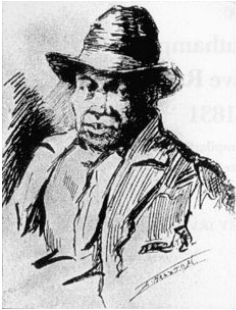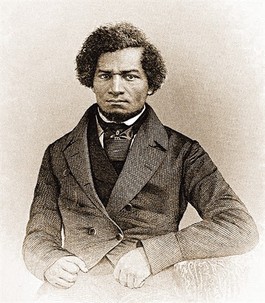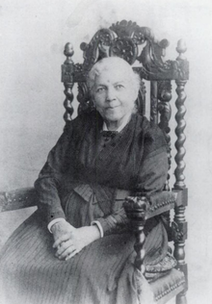Introduction: Slave Movement Expressed
Our house stood within a few rods of the Chesapeake Bay, whose broad bosom was ever white with sails from every quarter of the habitable globe. Those beautiful vessels, robed in purest white, so delightful to the eye of freemen, were to me so many shrouded ghosts, to terrify and torment me with thoughts of my wretched condition. I have often, in the deep stillness of a summer's Sabbath, stood all alone upon the lofty banks of that noble bay, and traced, with saddened heart and tearful eye, the countless number of sails moving off to the mighty ocean. The sight of these always affected me powerfully. My thoughts would compel utterance; and there, with no audience but the Almighty, I would pour out my soul's complaint, in my rude way, with an apostrophe to the moving multitude of ships:--
"You are loosed from your moorings, and are free; I am fast in my chains, and am a slave! You move merrily before the gentle gale, and I sadly before the bloody whip! You are freedom's swift-winged angels, that fly round the world; I am confined in bands of iron! O that I were free! O, that I were on one of your gallant decks, and under your protecting wing! Alas! betwixt me and you, the turbid waters roll. Go on, go on. O that I could also go! Could I but swim! If I could fly! O, why was I born a man, of whom to make a brute. The glad ship is gone; she hides in the dim distance. I am left in the hottest hell of unending slavery. O God, save me! God, deliver me!
Let me be free! Is there any God? Why am I a slave? I will run away. I will not stand it. Get caught, or get clear, I'll try it. I had as well die with ague as the fever. I have only one life to lose. I had as well be killed running as die standing. Only think of it; one hundred miles straight north, and I am free! Try it? Yes! God helping me, I will. It cannot be that I shall live and die a slave...There is a better day coming." - Narrative of the Life of Frederick Douglass, page 64-65
In this pivotal and revelatory point in his narrative, Frederick Douglass deeply considered the complexities of the slave experience. He compared his existence under slavery to that of a ship on the Chesapeake Bay. Truly, his reflections revealed how slavery confounded the notion of human freedom, both within a person and in a spatial sense. A slave was not free to travel; instead, travel and movement was determined by the will of the master. Still, there were enslaved people who pushed back on their imposed limitations and ventured toward personal and geographical freedom.
While the vast majority of the stories of travel and transformation were left unrecorded, there is a genre of literature in the form of slave narratives that preserve the record. These stories illustrate the ways in which slaves were bought, sold, transferred, "stolen," and abused in the Slave South under the law. The three narratives mapped and recorded on this project are ones that provide insight into the complexities of space and time in the Slave South. They grapple with effects of movement on the individual's motivation to escape or to act, the intricate association with literacy and movement, and the ways in which the Fugitive Slave Law extended the geographical boundaries of the South, if only in the mind of the fugitive.
While the vast majority of the stories of travel and transformation were left unrecorded, there is a genre of literature in the form of slave narratives that preserve the record. These stories illustrate the ways in which slaves were bought, sold, transferred, "stolen," and abused in the Slave South under the law. The three narratives mapped and recorded on this project are ones that provide insight into the complexities of space and time in the Slave South. They grapple with effects of movement on the individual's motivation to escape or to act, the intricate association with literacy and movement, and the ways in which the Fugitive Slave Law extended the geographical boundaries of the South, if only in the mind of the fugitive.



